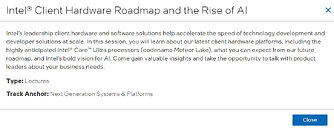TheLostSwede
News Editor
- Joined
- Nov 11, 2004
- Messages
- 18,834 (2.50/day)
- Location
- Sweden
| System Name | Overlord Mk MLI |
|---|---|
| Processor | AMD Ryzen 7 7800X3D |
| Motherboard | Gigabyte X670E Aorus Master |
| Cooling | Noctua NH-D15 SE with offsets |
| Memory | 32GB Team T-Create Expert DDR5 6000 MHz @ CL30-34-34-68 |
| Video Card(s) | Gainward GeForce RTX 4080 Phantom GS |
| Storage | 1TB Solidigm P44 Pro, 2 TB Corsair MP600 Pro, 2TB Kingston KC3000 |
| Display(s) | Acer XV272K LVbmiipruzx 4K@160Hz |
| Case | Fractal Design Torrent Compact |
| Audio Device(s) | Corsair Virtuoso SE |
| Power Supply | be quiet! Pure Power 12 M 850 W |
| Mouse | Logitech G502 Lightspeed |
| Keyboard | Corsair K70 Max |
| Software | Windows 10 Pro |
| Benchmark Scores | https://valid.x86.fr/yfsd9w |
Intel Innovation is Intel's yearly tech conference and the company has revealed some of what it'll share at the event that kicks off on the 19th of September. One of the sessions at the event is called Intel Client Hardware Roadmap and the Rise of AI and during that event, Intel will be sharing its latest "client hardware platforms" which according to the session blurb will include the upcoming Intel Core Ultra processors which currently goes under the codename of Meteor Lake.
It's unclear how much detail Intell will go into and based on the subject of the session, this should most likely be focused on the desktop platform, but could also cover the mobile parts. According to VideoCardz we should expect Intel to detail the integrated VPU which is said to be based on hardware from Movidius, a company Intel acquired a few years ago and that focused on making machine learning hardware. The VPU should be a low-power accelerator that handles AI inference tasks that will be part of at least some future Intel processors, but for now, we don't really know what Intel's plans are for these types of features in its CPUs, apart from offering something competitive with AMD's Xilinx derived AI Engine.

View at TechPowerUp Main Site | Source
It's unclear how much detail Intell will go into and based on the subject of the session, this should most likely be focused on the desktop platform, but could also cover the mobile parts. According to VideoCardz we should expect Intel to detail the integrated VPU which is said to be based on hardware from Movidius, a company Intel acquired a few years ago and that focused on making machine learning hardware. The VPU should be a low-power accelerator that handles AI inference tasks that will be part of at least some future Intel processors, but for now, we don't really know what Intel's plans are for these types of features in its CPUs, apart from offering something competitive with AMD's Xilinx derived AI Engine.

View at TechPowerUp Main Site | Source





